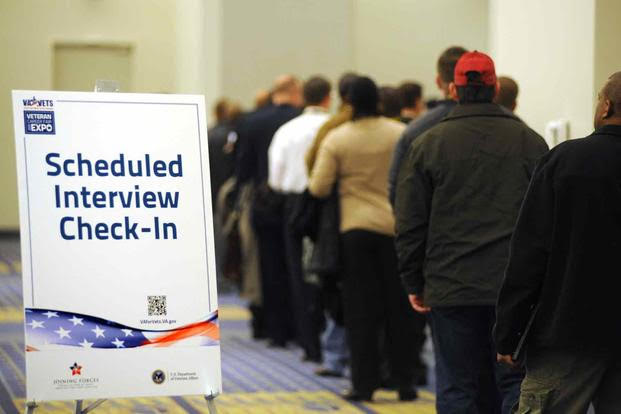Huge Hiring Burst in January of 517,000 Jobs Brings Down Vets’ Unemployment Rate to 2.8%
The Department of Veterans Affairs hosts a major Veteran Career Fair in Washington, D.C.
The economy added a whopping 517,000 jobs in January, blowing way past Wall Street predictions of job growth of less than half that total and bringing the unemployment rate for the nation’s more than 18 million veterans down to a remarkable 2.8% from 3.2% in December.
However, the overall positive numbers in the monthly employment situation report from the Bureau of Labor Statistics released Friday were slightly offset by a jump in the jobless rate for post-9/11 veterans from 3.0% in December to 3.8% in January.
The 3.8% rate for the post-9/11 Iraq and Afghanistan-era veterans topped the national unemployment rate for all Americans in January of 3.4%, down slightly from 3.5% in December and the lowest monthly mark since 1969.
It was the first time since January 2022 that the jobless rate for post-9/11 veterans exceeded the national average, but veterans groups said the main takeaway from the BLS report was a plus for veterans going forward despite fears of a recession in the second half of this year.
“It really is positive and definitely shows the link between the economic situation and the market for employment,” said Kevin Rasch, regional director in Florida for the Warriors to Work program of the Wounded Warrior Project.
He said the jump in the jobless rate for post-9/11 veterans could be partially attributed to the widespread layoffs in the tech industry and also to a seasonal downturn in retail hiring between Thanksgiving and the Christmas holidays.
Rasch and Tom Porter, legislative director of Iraq and Afghanistan Veterans of America, also noted some concerns raised by recent volatility in the jobless rates for those classified by the BLS as Gulf War 1-era veterans who served between August 1990 and August 2001.
The jobless rate for the estimated 4.2 million Desert Storm-era veterans spiked to 3.1% in December, which was still a relatively good number but also marked the first time in memory that the unemployment rate for Gulf War 1-era veterans exceeded the 3.0% rate for post-9/11 veterans.
Porter said the spike in the jobless rate for the Gulf War 1-era veterans could have been a seasonal anomaly, and noted that the unemployment rate for those veterans had come down considerably to 1.9% in what was “really good news, just showing overall long-term progress” for veterans in general in the January BLS report.
“There’s increasing knowledge in the economic sector of the value of hiring veterans,” Porter said. He added that the hiring burst by employers in January could result in members of the Federal Reserve having to “rethink their strategy” of raising interest rates to cool off the hot labor market in the effort to bring down inflation.
At the White House on Friday, President Joe Biden appeared to make the same point in touting the BLS jobs report as evidence that “the Biden economic plan is working. Inflation is continuing to come down,” he said, and “take home pay for workers is going up.”
Biden also took a shot at critics who say “the only way to slow down inflation is by destroying jobs,” and said the huge hiring spike of more than a half-million jobs in January came about even as inflation slowed from 9.5% in June to 6.5% in December.
Federal Reserve Chairman Jerome Powell has been consistent in suggesting that more interest rate hikes would be necessary to bring down inflation by slowing job growth, although he appeared earlier this week to leave open the possibility that the job market could prove resilient even as inflation subsided.
“My base case is that the economy can return to 2% inflation without a really significant downturn or a really big increase in unemployment,” Powell said Wednesday after a meeting of the Fed’s Open Market Committee. “I think that’s a possible outcome. I think many, many forecasters would say it’s not the most likely outcome, but I would say there’s a chance of it.”
The chances of that unlikely outcome got a significant boost from the “blockbuster jobs report for all Americans” from the BLS’ January report, said Robert Frick, corporate economist for Navy Federal Credit Union.
In a statement, Frick said the latest data showed that the jobs situation for veterans improved through last year, and “it also means the job environment is better for all Americans this year than we had thought a month ago.”



